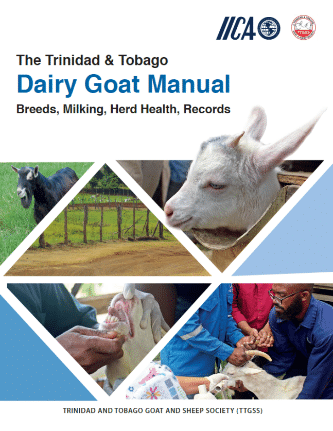At the beginning of this process, a group of more than 20 actors participated in a series of workshops to identify the main challenges facing the value chain.
IICA has been collaborating with the Trinidad and Tobago Goat and Sheep Society (TTGSS), under its Flagship Project: Sustainability and Competitiveness of Agricultural Chains, to develop the local dairy goat value chain.
At the beginning of this process, a group of more than 20 actors participated in a series of workshops to identify the main challenges facing the value chain.
Among these challenges they identified the following:
- The need to strengthen the institutional framework to improve support to the sector.
- Establish and strengthen coordination and dialogue mechanisms.
- Strengthen technical capabilities of the different chain actors, including extension officers.
- Define Good Agricultural Practices (GAP), Good Manufacturing Practices (GMP) and Standard Operating Procedures (SOP) for producing high quality milk, with acceptable standards for packaging and labelling for stakeholders in the chain.
- Strengthen the capacity of producers, processors and others along the goat dairy value chain to consistently produce high quality milk and value-added products from goats’ milk to effectively access markets and improve income.
- Implement a marketing strategy to take advantage of business opportunities beyond the current farm-gate sale.
Based on those challenges, the following lines of action were prioritized:
- Establishment and strengthening of the dairy goat chain committee.
- Design and implementation of a capacity building program to promote product and process innovations.
- Facilitate market access for value added products.

Progress
In order to guide the dairy goat value chain development, a Dairy Stakeholder’s Committee was established and a business plan to achieve the goals of increased production; productivity and market access for value added products was developed and is now being implemented.
Sixty (60) members of the TTGSS and other stakeholders were able to increase their productivity, quality of goat’s milk and other value added products in order to increase access to markets through a series of capacity building activities and instruments.
- Capacity building activities on the following topics: husbandry management practices, including sanitation, feed mixing, breed selection, castration, hoof trimming and dehorning; housing management and construction; animal health and nutrition; elaboration of cheese and yogurts; and business management, focused record keeping and entrepreneurship.
- To supplement the training activities, the following public goods were developed and disseminated among producers: The Trinidad & Tobago Dairy Goat Manual: Breeds, Milking, Herd Health, Records and fact sheets on clitoria, kudzu, leucaena, moringa, mulberry, tithonia, trichanthera and gliricidia.
Regarding market access, a marketing strategy was developed under the business plan for the chain, including information on market segmentation, promotion and branding, market penetration, marketing channels, pricing strategy and new product development.
The progress accomplished so far has been due to the great interest and enthusiasm by the industry, ignited by the focus and direction from the stakeholders’ committee and by the capacity-building program for stakeholders. Another key factor is the support received by various agencies and institutions such as the Graduate School of Business Studies, School of Veterinary Medicine of the University of West Indies, and the Supermarkets’ Association.
For 2017, the Project will continue supporting the strengthening of the Dairy Goat Committee as well as the capacities of the different actors, and consolidating the marketing strategy, focusing on the penetration of local value added products in the mainstream supermarkets.
For more information contact: daniel.rodriguez@iica.int
*The opinions expressed in this newsletter are those of the authors and they do not reflect the position of the Institute on the topics presented.
*This post appears in the IICA Delegation in the USA Newsletter – March – April 2017











